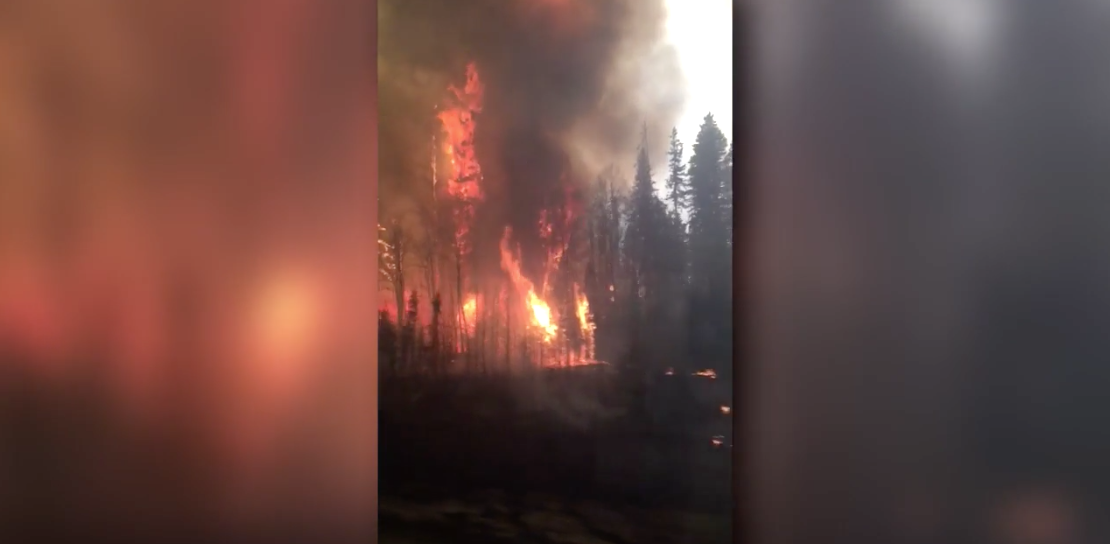F lames kept blocking Highway 63 — the only way via road out of Fort McMurray to the rest of the world — hindering the egress of hundreds of vehicles filled with men, women and children who attempted to flee the raging wildfires which ravaged the community of approximately 62,000 residents.
An estimated 88,000 people have already fled the area, which is part of the greater than 250,000 acres of land that has already been scorched — and there is a possibility that the fire could double in size over the weekend and rage on for weeks in this area of the province of Alberta which has not experienced any significant rainfall within the past two months.
An Entire Community is Evacuated Due to Raging Fires — With No Return Anytime Soon
In addition to Fort McMurray, the communities of Anzac, Gregoire Lake Estates and Fort McMurray First Nation were under mandatory evacuation orders. “Residents of Fort McMurray should not expect to return home for an extended period of time”, according to this update from the official Internet web site of the province of Alberta. “Public safety is our number-one priority, and residents won’t be able to return home until it is safe to do so.”
Earlier today, approximately 1,200 vehicles and thousands of people were able to pass through a control point under the escort of the Royal Canadian Mounted Police to evacuate the Fort McMurray area from north of the city to safe areas south of the city.
The city of Edmonton — approximately 270 miles south and also located within the province of Alberta — has opened its doors to those who need shelter. The problem is that the evacuation has clogged Highway 63, choked with traffic which it was not designed to handle. What would normally take minutes to drive short distances consumed hours instead for harried motorists, causing vehicles to be abandoned on the side of the highway as fuel supplies diminished — but the congestion has been relatively eased, with stops for food and fuel established along the highway for the convoys of vehicles headed south.
Some evacuees headed north on the highway, which dead-ends at the oil sands where large work camps are located — but the massive fire cut off the work camps by blocking the highway, prompting evacuation efforts from there as well, according to this article written by Ian Austen of The New York Times.
“It looked like a war zone,” Jim Dunstan — a resident of Fort MacMurray said at a rest stop south of the fire-ravaged city as he escaped with his wife and two young sons but ran out of gasoline, according to this article from the Toronto Star. “It was shocking to see the damaged cars all burned on the side of the road. It made you feel lucky to get out of there.”
In addition to the vehicles which burned from being close in proximity to trees being on fire on either side of the road, blocks of buildings — greater than 1,600 homes and other structures — have also been reduced to rubble and ash.
Here is a video from Josh (Chief Canuck):
My uncle sent me this video of him being evacuated in Fort McMurray from the job site he was working at. Crazy stuffhttps://t.co/hWTNMg5ToC
— Chief Canuck (@ChiefCanuck) May 5, 2016
The Latest Information of the Current Situation
Announcements are updated from the province of Alberta — including this latest one, which was issued earlier today:
- The government of Alberta will provide emergency financial assistance of $1,250.00 per adult and $500.00 per dependant to help meet immediate needs
- Ground evacuations of people north of Fort McMurray began today — and will continue during daylight hours as weather and fire conditions permit — where vehicles are permitted to travel south on Highway 63 towards Edmonton or alternative accommodation
- A provincial fire ban is in effect across Alberta:
- All fire permits are suspended and no new fire permits will be issued
- All open fires, including campfires and charcoal briquettes, are prohibited
Fire Fighting Efforts
Greater than than 1,200 firefighters, approximately 110 helicopters, 295 pieces of heavy equipment and more than 27 air tankers are fighting the total of 40 wildfires which are currently burning across the province of Alberta with “with five out of control, eight being held, 21 under control, and six turned over to the responsible parties.”
Weary firefighters have been battling the blaze, which caught the community of Fort MacMurray by surprise with its unpredictable — and violent — nature, forcing it to be under an official provincial state of emergency. Dispatched from as far away as the province of Québec, the army of firefighters and equipment has been steadily increasing in numbers — but the fire has resisted valiant efforts of being extinguished with the aid of little rainfall and high winds gusting up to 40 kilometers per hour.
Summary
The Canadian Red Cross is accepting donations via telephone, the Internet, or via text message. The Alberta government will match donations made to the Red Cross.
The best way to provide support is by sending a donation to the Red Cross. The municipalities and evacuation centres are not equipped to accept or manage donations from the public at this time — in fact they can even create logistical concerns; and volunteers are not required at this time.
The cause of the fires has yet to be determined.
Obviously, if your travels include the Fort McMurray area of Alberta in the foreseeable future, you will need to change your plans accordingly.
In the meantime, my thoughts and prayers go out to the residents of Fort McMurray and surrounding areas who have displayed an unbounded spirit and patience during this extraordinarily serious situation.
Source: Josh (Chief Canuck) from Twitter.
